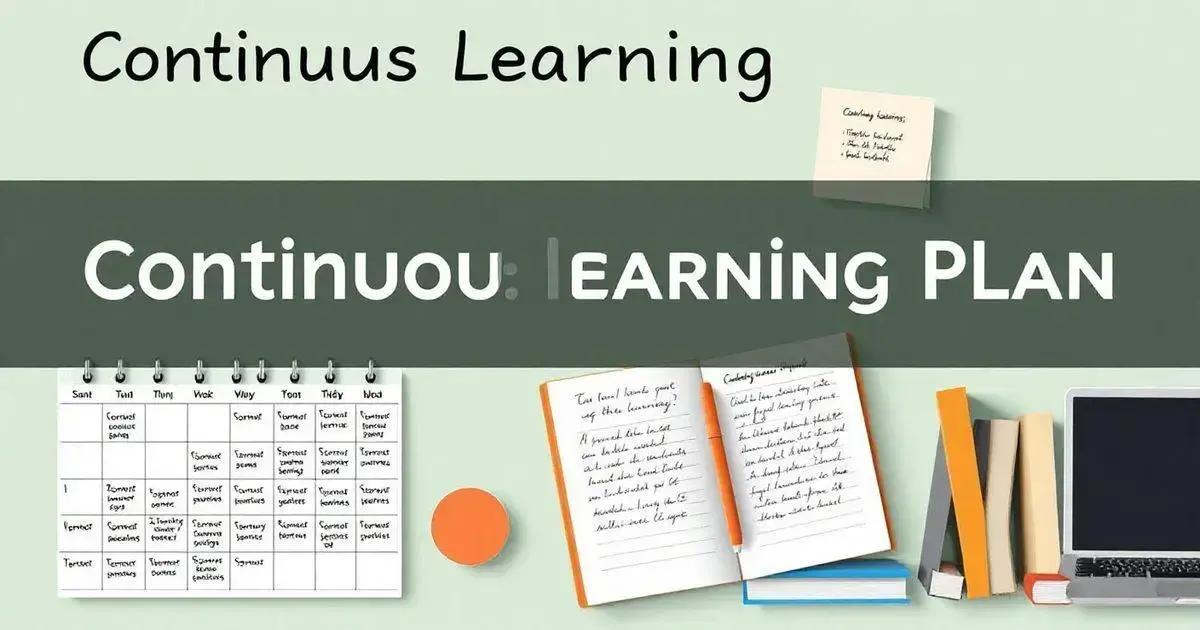Continuous learning for professionals is essential in today’s ever-changing work environment. To stay competitive, it’s crucial to continually acquire new skills and knowledge. This ongoing process helps professionals stay ahead in their careers and adapt to new challenges.
Whether through formal education or hands-on experiences, continuous learning offers endless opportunities for growth. It enhances job performance and keeps you adaptable to industry changes.
Curious about how to get started? Keep reading to explore effective ways to incorporate learning into your routine and boost your career.
Understanding Continuous Learning
Understanding continuous learning for professionals is crucial for those who want to remain competitive in their fields. It involves an ongoing, voluntary, and self-motivated pursuit of knowledge for personal or professional development.
Continuous learning for professionals can take many forms, from formal education to informal experiences.
What is Continuous Learning?
Continuous learning means continuously improving your skills and knowledge. It is more than just attending workshops or online courses. It involves applying what you learn, seeking feedback, and adapting to new challenges. Professionals engage in continuous learning to enhance their capabilities and improve job performance.
Why is Continuous Learning Important?
In today’s fast-paced world, technology and processes change rapidly. To keep pace, professionals must stay updated. Continuous learning helps you:
- Adapt to changes in your industry
- Enhance your skill set
- Expand your professional network
By maintaining a commitment to learning, you can increase your employability and career satisfaction.
Types of Continuous Learning
There are several ways to engage in continuous learning, including:
- Formal Education: This can include degrees and certifications.
- Online Courses: Platforms like Coursera or LinkedIn Learning offer courses on various topics.
- Workshops and Seminars: These provide hands-on learning experiences.
- Networking: Engaging with peers can provide valuable insights.
- Self-Study: Reading books, articles, and research papers is a personal way to learn.
Each method has its benefits, and combining them can lead to a more rounded learning experience.
Creating a Learning Mindset
To embrace continuous learning, develop a growth mindset. This means viewing challenges as opportunities to grow rather than obstacles. Don’t be afraid to make mistakes; they are part of the learning process. Set aside time each week to engage in learning activities that interest you.
Benefits of Continuous Learning for Professionals

Benefits of continuous learning for professionals are numerous and impactful. Engaging in ongoing learning not only enhances your skills but also provides several advantages in your career.
1. Improved Job Performance
Continuous learning for professionals helps individuals stay updated with the latest trends and methodologies in their industry. This knowledge can lead to improved productivity and better quality of work.
2. Career Advancement
Employees who embrace continuous learning are often seen as more valuable. This commitment can lead to promotions, raises, and greater job security. Staying competitive in your field often requires new skills and knowledge.
3. Increased Adaptability
The business world is constantly changing. Professionals who engage in continuous learning can adapt more easily to new technologies, processes, and challenges. This adaptability can also help in problem-solving and innovation.
4. Greater Job Satisfaction
Learning new things can be fulfilling and enjoyable. Professionals often feel more engaged and satisfied with their jobs when they are actively improving their skills. This satisfaction can translate into a more positive work environment.
5. Networking Opportunities
Engaging in learning opportunities, such as workshops or online courses, allows professionals to meet new people in their field. Expanding your network can lead to new career opportunities and collaborations.
6. Enhanced Confidence
With new skills and knowledge, professionals often feel more confident in their abilities. This boost in self-esteem can improve interactions with colleagues, clients, and stakeholders.
7. Lifelong Learning Culture
By committing to continuous learning, professionals help create a culture of growth in their workplace. Encouraging others to pursue learning can lead to a more innovative and forward-thinking organization.
Top Resources for Continuous Learning
Top resources for continuous learning for professionals are essential tools that individuals can use to enhance their skills and knowledge. These resources come in many forms and can help anyone looking to advance their careers.
1. Online Learning Platforms
Websites like Coursera, edX, and LinkedIn Learning offer a wide range of courses covering various subjects. You can learn at your own pace and choose topics that interest you.
2. Webinars and Workshops
Participating in live webinars and workshops can provide real-time learning experiences. Websites like Eventbrite and Meetup often list local and virtual events you can join.
3. Podcasts
Podcasts are a fantastic way to learn while on the go. Shows like “The Knowledge Project” and “WorkLife with Adam Grant” feature conversations with experts and provide valuable insights into various fields.
4. Books and eBooks
Reading books continues to be one of the best ways to gain knowledge. Look for motivational or skill-based books. Platforms like Audible offer audiobooks if you prefer listening.
5. Professional Associations
Joining a professional organization in your industry can provide resources, networking opportunities, and access to exclusive events. These associations often have newsletters and training programs for members.
6. Online Forums and Communities
Engaging in online communities like Reddit or LinkedIn groups can connect you with peers. These platforms allow you to share experiences, ask questions, and learn from others.
7. Mentorship Programs
Finding a mentor can greatly enhance your learning. Mentors can share their knowledge, provide guidance, and help you navigate challenges in your career. Look for formal mentorship programs in your company or industry.
By utilizing these top resources, you can ensure your continuous learning for professionals journey is effective and impactful.
Creating a Continuous Learning Plan

Creating a Continuous learning for professionals plan is essential for those who want to effectively manage their learning journey. A well-structured plan can guide your growth and help you achieve your goals.
1. Set Clear Goals
The first step in creating your plan is to set clear, achievable goals. Ask yourself what you want to learn and why. Make your goals specific and measurable, such as “Learn basic coding skills in three months.”
2. Identify Learning Resources
Use a variety of resources like online courses, books, workshops, and podcasts based on your goals. Make sure to select materials that suit your learning style.
3. Create a Timeline
Establish a realistic timeline for accomplishing your learning goals. Break your plan into smaller tasks and set deadlines for each. This helps stay on track and maintain motivation.
4. Schedule Regular Learning Time
Dedicate specific times each week to learning. Whether it’s an hour each morning or a few evenings a week, having a routine ensures you prioritize your education.
5. Track Your Progress
Keeping notes on what you’ve learned is important. Consider maintaining a learning journal or using digital tools to track your progress. Celebrate small wins to stay motivated!
6. Seek Feedback
Engage with peers or mentors to get feedback on your learning. Constructive criticism can help refine your skills and deepen your understanding of the material.
7. Revise and Adapt
Be flexible with your plan. If certain methods or resources are not working for you, don’t be afraid to change them. Regularly review your goals and adjust your plan for continued improvement.
By embracing Continuous learning for professionals, you ensure that you’re always growing and adapting in your career.
Overcoming Barriers to Continuous Learning
Overcoming barriers to continuous learning for professionals is essential for those who want to enhance their skills and knowledge. Several challenges can impede learning, but with the right approach, you can conquer these obstacles.
1. Time Constraints
Many professionals feel they do not have enough time to dedicate to learning. To overcome this, prioritize your learning by scheduling specific blocks of time each week. Even small, consistent efforts can lead to substantial progress.
2. Lack of Access to Resources
Access to educational resources can be limited due to finances or location. Utilize free online platforms like Khan Academy or Coursera, which offer many free courses. Public libraries also have valuable resources.
3. Fear of Failure
A fear of not succeeding can hold professionals back. Remember that mistakes are part of the learning process. Embrace challenges as opportunities for growth and gain confidence through practice.
4. Motivation Issues
Sometimes, it can be difficult to stay motivated. Set achievable goals and reward yourself when you meet them. Finding a study buddy or joining a learning group can also provide encouragement and accountability.
5. Workplace Culture
In some organizations, there may be a lack of support for continuous learning for professionals. Seek out colleagues who value learning and create a community. Advocate for training opportunities within your workplace to foster a culture of growth.
6. Information Overload
With so many learning resources available, it can be overwhelming to choose where to start. Focus on a specific skill or topic at a time, and create a structured plan that outlines the key areas you want to learn about.
7. Balancing Learning with Work
Finding the right balance between work and learning can be challenging. Look for ways to integrate learning into your daily tasks. For example, use new skills in your projects or seek feedback to enhance your learning experience.
FAQ – Frequently Asked Questions about Continuous Learning for Professionals
What is continuous learning?
Continuous learning is an ongoing process of acquiring new skills and knowledge throughout your professional life, adapting to changes in your industry.
Why is continuous learning important for professionals?
It helps professionals stay competitive, improve job performance, and adapt to rapidly changing work environments, enhancing both personal and career development.
What resources can I use for continuous learning?
You can access online courses, webinars, books, podcasts, and professional associations, as well as seek mentorship and networking opportunities.
How can I create a continuous learning plan?
Start by setting clear objectives, identifying resources, creating a timeline, and scheduling regular learning time to track your progress.
What are common barriers to continuous learning?
Some common barriers include time constraints, lack of access to resources, fear of failure, and workplace culture that doesn’t support learning.
How can I measure the impact of my continuous learning efforts?
You can assess your learning through tests, track performance metrics, gather feedback, and reflect on your learning experiences and career progression.